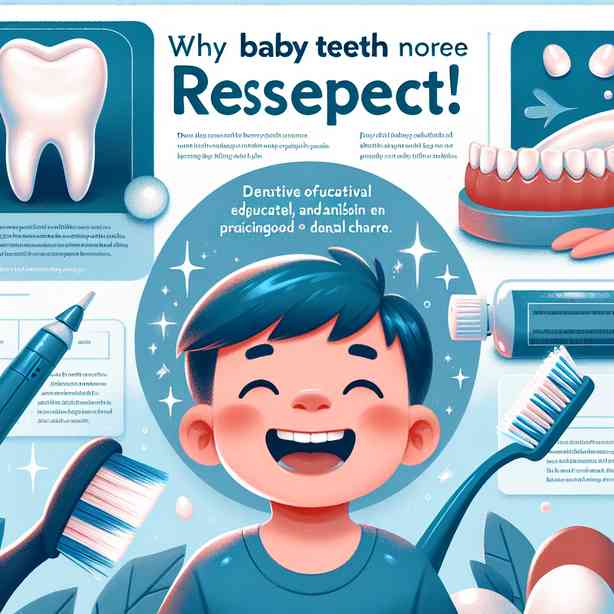
**Why Baby Teeth Deserve More Respect**
Baby teeth, or primary teeth, are often dismissed as simply placeholders for the permanent teeth that will eventually emerge. However, they play a crucial role in the overall development of a child’s oral health, self-esteem, and nutritional habits. Despite their temporary nature, baby teeth deserve significantly more respect than they often receive. Understanding their functions, significance, and the implications of neglecting them is vital for parents, caregivers, and educators alike.
The primary purpose of baby teeth goes beyond just holding space for the adult teeth. They aid in speech development, allow children to chew food efficiently, and are essential for proper jaw growth and development. When children lose their baby teeth prematurely due to decay or injury, it can lead to misalignment of the permanent teeth, requiring orthodontic treatment later in life. Moreover, primary teeth are vital for developing proper speech patterns. The presence of these teeth allows children to form sounds more accurately, contributing significantly to their ability to communicate as they grow.
Furthermore, baby teeth play a crucial role in a child’s confidence and self-esteem. A child with healthy, intact baby teeth is more likely to smile freely and engage with their peers. On the other hand, children who experience dental issues or cavities may feel self-conscious about their appearance, leading to hesitance in social interactions. Consistently promoting oral health care from an early age can instill lifelong habits, setting a positive tone for dental hygiene into adulthood.
It’s important to recognize that dental health is closely linked to overall health. Cavities and gum disease in baby teeth can lead to pain, infection, and even systemic health issues. For instance, untreated dental decay can result in difficulties in eating, leading to nutritional deficiencies. Furthermore, the bacteria from infections in baby teeth can inadvertently affect the child’s general health and well-being. Parents and caregivers should ensure that regular dental check-ups are part of their child’s routine to prevent decay and related complications.
Moreover, nutrition plays a vital role in maintaining strong and healthy baby teeth. A balanced diet rich in calcium, vitamins, and minerals is essential for the growth and strength of teeth. Foods that are high in sugars can contribute to the rapid formation of cavities, making it crucial to monitor and limit sugary snacks and beverages. Educating children about the benefits of good nutrition and involving them in making healthy food choices can lay a solid foundation for their long-term oral health.
Establishing good habits around oral hygiene is also critical. Parents should introduce tooth brushing as soon as the first tooth erupts, using a soft-bristled toothbrush and a small amount of fluoride toothpaste. It is essential for children to understand the importance of brushing twice a day and flossing daily. Additionally, making tooth brushing a fun and engaging activity can help children develop a positive attitude toward maintaining their dental health.
Caring for baby teeth also means understanding and addressing dental anxiety, which can affect children facing their first dental visits. Ensuring that these experiences are positive and stress-free can encourage children to maintain regular dental appointments throughout their lives. Gentle explanations, using kid-friendly language, and perhaps even implementing rewards for good behavior at the dentist can alleviate fears. A child’s first experiences with the dentist can set them up for a lifetime of healthy dental visits.
The role of parents and caregivers in managing their child’s dental health cannot be overstated. It’s essential for them to lead by example, demonstrating good oral hygiene habits and making dental care a family priority. By showing children that dental visits are normal and important, families can help dissipate any fears surrounding the dentist. In-home practices and education about oral health can encourage a culture of respect for dental care from a young age.
In conclusion, baby teeth, while temporary, serve essential purposes that extend well beyond their brief existence. They aid in speech development, confidence, and nutrition, and lay a strong foundation for a child’s permanent teeth. Ignoring the health and care of these teeth can lead to a myriad of problems, both dental and systemic. Therefore, it is vital to respect and care for baby teeth just as we would for adult teeth. Recognizing their importance and establishing good hygiene and nutrition habits from an early age will contribute to long-term health, confidence, and well-being for children. It’s time to give baby teeth the respect they truly deserve, understanding that they are not just placeholders, but integral components of a child’s development and health.


